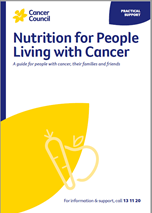- Home
- Stomach cancer
- Managing side effects
Managing side effects of stomach cancer
Stomach cancer and its treatment can cause many side effects. Some of these side effects are permanent and may change what you can eat, and how you digest foods and absorb essential nutrients. Here we look at the common side effects and how to manage them.
Learn more about:
- Eating after treatment
- Poor appetite and weight loss
- Swallowing difficulties
- Dumping syndrome
- Anaemia and osteoporosis
Eating after treatment
During and after treatment, you need to eat and drink enough to get the nutrition you need, maintain your weight and avoid dehydration. Ask your doctor for a referral to a dietitian with experience in cancer care, who can give you more information. If you are eating less than usual, it is often recommended that you have high energy and high protein foods and relax healthy eating guidelines. You may need a feeding tube during or after treatment if you are unable to eat and drink enough to meet your nutritional needs.
After treatment, you may find that some foods are uncomfortable to eat and cause digestive problems. You will need to try different foods and change your eating habits, such as eating smaller meals more often throughout the day.
You may find it hard to accept the differences in how and what you can eat. It’s natural to feel self-conscious or worry about eating in public or with friends. It may help to let your family and friends know how you feel, or to speak with a counsellor or someone who has been through a similar experience. They may be able to give you advice to help you adjust. It may take time and support to adapt to your new way of eating.
For more on this, see Nutrition and cancer.
→ READ MORE: Poor appetite and weight loss
Podcast: Appetite Loss and Nausea
Listen to more episodes from our podcast for people affected by cancer
Prof David I Watson, Matthew Flinders Distinguished Professor of Surgery, Flinders University, and Senior Consultant Surgeon, Oesophago-Gastric Surgery Unit, Flinders Medical Centre, SA; Prof Bryan Burmeister, Senior Radiation Oncologist, GenesisCare Fraser Coast and Hervey Bay Hospital, QLD; Kieran Cahill, Consumer; Jessica Jong, Clinical Dietitian, Upper GI and Hepatobiliary Services, Peter MacCallum Cancer Centre, VIC; John Leung, Consumer; Prof Rajvinder Singh, Professor of Medicine, University of Adelaide, and Director, Gastroenterology Department and Head of Endoscopy, Lyell McEwin Hospital, SA; Dr Sarah Sutherland, Medical Oncologist, Chris O’Brien Lifehouse, NSW; Paula Swannock, Upper GI Cancer Nurse Consultant, St Vincent’s Hospital Melbourne, VIC; Rebecca Yeoh, 13 11 20 Consultant, Cancer Council Queensland.
View the Cancer Council NSW editorial policy.
View all publications or call 13 11 20 for free printed copies.


